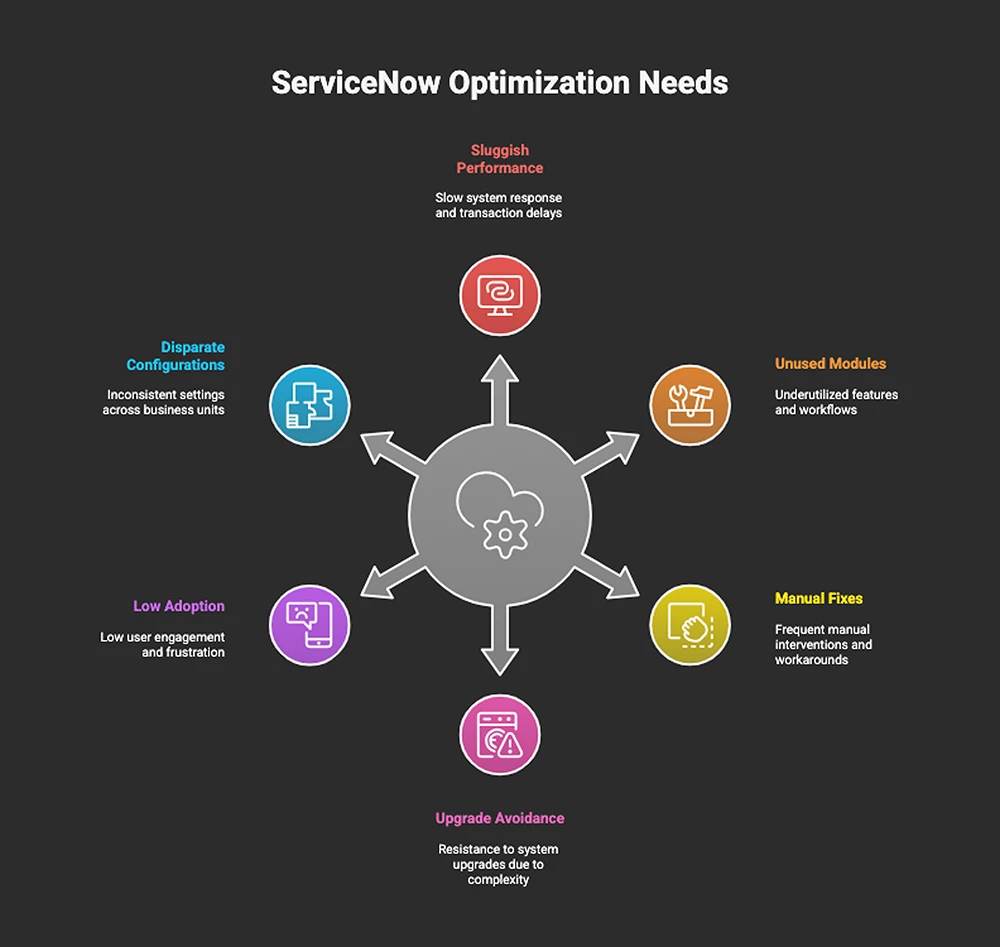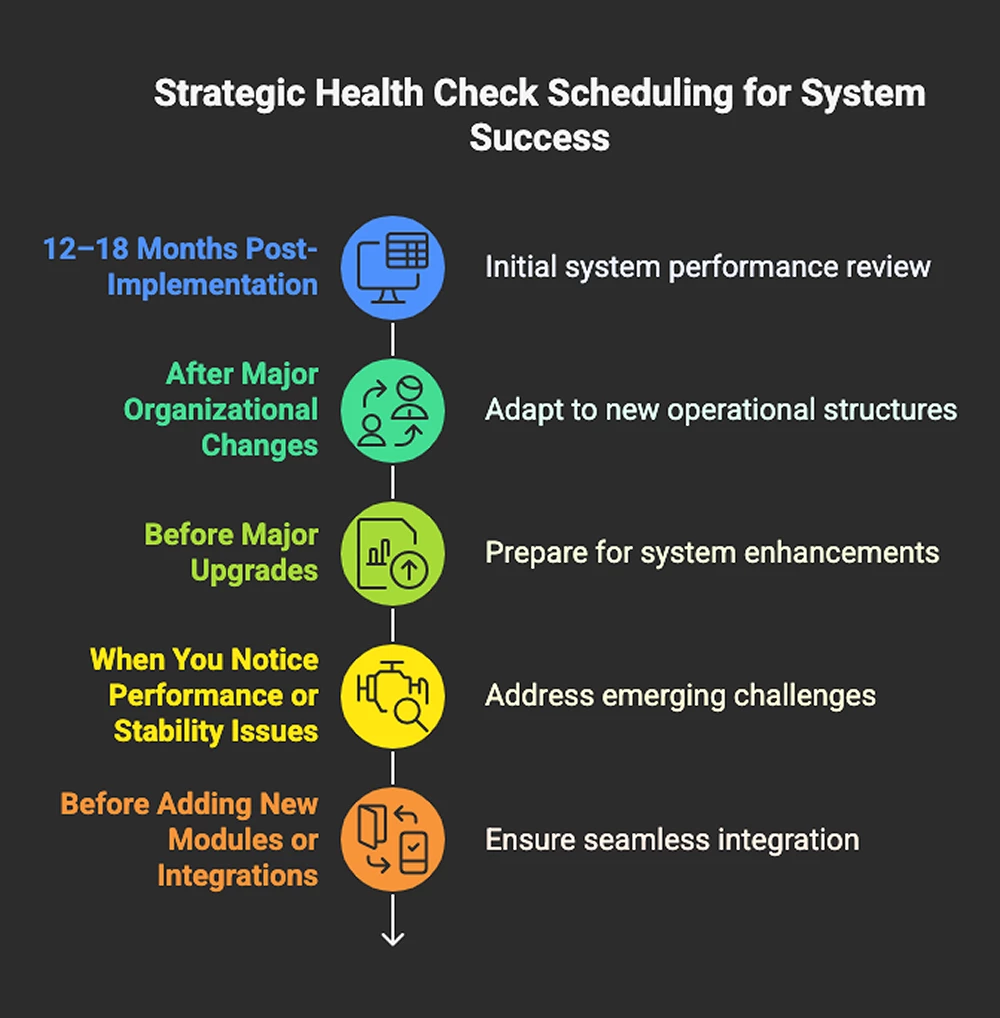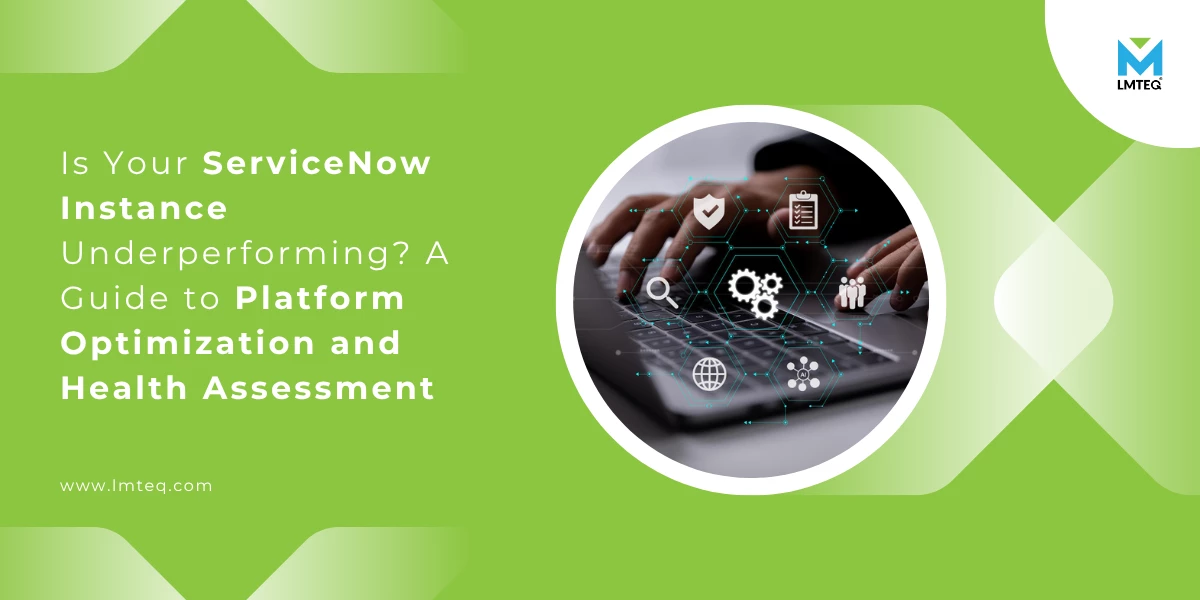ServiceNow has become the backbone of enterprise service management – streamlining IT workflows, automating tasks, and improving user experiences. But what many organizations don’t realize is that simply implementing ServiceNow isn’t enough to guarantee long-term success.
Over time, performance issues, excessive customization, and poor instance governance can quietly erode your investment. As new features are added and business demands evolve, your platform can become bloated, inconsistent, and difficult to maintain, often without obvious warning signs.
This is where the ServiceNow platform optimization becomes critical.
Without regular oversight, businesses risk building up technical debt, leading to slower response times, integration failures, and upgrade complications. A periodic ServiceNow performance audit can uncover these issues before they impact productivity or user satisfaction.
Treating your ServiceNow instance as a living platform – not a static implementation – is the first step toward maintaining ROI, scalability, and operational efficiency.
Common Signs Your ServiceNow Platform Needs Optimization

1. Sluggish Performance and Delayed Transactions
If dashboards take too long to load or workflows lag, your users are already losing productivity. Poorly written scripts, misconfigured tables, or excessive customizations often lie at the root.
2. Unused Modules and Orphaned Workflows
Your platform may contain unused applications or half-built workflows that serve no purpose. These not only clutter the system but also create confusion and maintenance overhead.
3. Frequent Manual Fixes and Workarounds
If your admins constantly apply manual patches, quick-fix scripts, or undocumented changes, your ServiceNow platform health is likely at risk. Over time, this leads to instability and future upgrade issues.
4. Upgrade Pain or Avoidance
Delaying upgrades due to fear of breaking workflows or integrations is a red flag. It typically means customizations haven’t been maintained according to ServiceNow best practices.
5. Low Adoption and Frustrated Users
A clunky interface, broken workflows, or slow load times will drive users away. This impacts ROI and reflects poor optimization planning.
6. Disparate Configurations Across Business Units
As more departments come on board, configuration inconsistencies can appear. Without a unified framework, technical debt piles up fast.
The Risks of Ignoring Platform Health
When your ServiceNow platform is quietly accumulating inefficiencies, the consequences can be more than just technical — they can directly affect business continuity, cost, and user trust. Here’s what’s at stake when ServiceNow health audits are overlooked:
1. Growing Technical Debt
Every undocumented customization, deprecated script, or forgotten workflow adds to your platform’s technical debt. Eventually, even routine changes can become time-consuming and risky.
2. Skyrocketing Support and Maintenance Costs
Poorly optimized platforms require more manual fixes, more IT resources, and more reactive troubleshooting — all of which inflate your operational budget.
3. Breakage During Upgrades
A neglected platform is rarely upgrade-ready. Incompatible customizations, outdated APIs, and neglected schema changes can break essential functionality during version updates.
4. Poor Visibility Across Business Processes
Without a clean and healthy architecture, reporting and analytics suffer. Decisions are made on inconsistent data, reducing the platform’s strategic value.
5. User Dissatisfaction and Adoption Drop
Slow, confusing, or broken experiences frustrate users. If they find workarounds outside ServiceNow, your platform loses credibility — and so does your IT leadership.
6. Reduced Agility and Innovation
A fragile platform makes it harder to introduce new features, integrations, or modules. Over time, this hampers your organization’s ability to scale and innovate.
This is why regular ServiceNow health assessments are not optional — they are foundational to long-term success.
What a ServiceNow Health Assessment Should Cover
A ServiceNow health assessment isn’t just about spotting bugs or measuring uptime. It’s a deep dive into your platform’s architecture, performance, and strategic alignment — aimed at restoring stability, improving efficiency, and enabling growth.
Here’s what a comprehensive ServiceNow health assessment should include:
1. Performance Benchmarking
How fast do your key modules and transactions run under load? This step identifies bottlenecks and sets a baseline for improvement. It forms the core of any reliable ServiceNow performance audit.
2. Instance Architecture Review
This includes an analysis of your table structures, indexes, and script executions. Poor architecture leads to long-term performance issues and difficult upgrades, especially in complex environments.
3. Customizations and Scripting Audit
Over-customization is one of the top reasons why ServiceNow platforms break during upgrades. This audit highlights unsupported code, unused scripts, or unnecessarily complex workflows.
4. Integration Health and Reliability
Are your ServiceNow workflows reliably syncing with external systems like SAP, Active Directory, or third-party APIs? A solid ServiceNow instance review checks for integration latency, error logs, and failure recovery setups.
5. Security and Access Review
Misconfigured access roles and permissions are a major compliance risk. A health assessment should evaluate data protection practices, role hierarchies, and audit trails.
6. Governance and Upgrade Readiness
Finally, it should assess how well your instance aligns with ServiceNow’s recommended governance model and whether it’s technically and operationally ready for the next platform release.
This isn’t just a health check — it’s an opportunity to future-proof your platform and drive long-term ROI.
When to Schedule a Health Check

A healthy ServiceNow platform isn’t a one-time achievement — it’s a continuous effort. Knowing when to schedule a ServiceNow health audit can make the difference between proactive improvement and reactive firefighting.
Here are the best times to consider a full ServiceNow performance audit:
1. 12–18 Months Post-Implementation
Once initial use cases are live and your teams are settled in, a review helps assess what’s working, what isn’t, and what’s been neglected.
2. After Major Organizational Changes
Mergers, acquisitions, or department-wide expansions often introduce complexity. A ServiceNow instance review ensures your platform scales correctly and remains aligned with your new business model.
3. Before Major Upgrades
A ServiceNow upgrade can easily break workflows if the instance has accumulated unsupported scripts or outdated modules. Pre-upgrade health checks reduce the risk of production downtime.
4. When You Notice Performance or Stability Issues
Slow UI, failing automations, or integration errors are clear indicators that your ServiceNow platform health needs urgent attention.
5. Before Adding New Modules or Integrations
Adding new applications on top of an unstable foundation can amplify issues. A ServiceNow health assessment ensures you’re building on solid ground.
In short, if your business has grown, changed, or simply been using ServiceNow for a while, it’s time for a check-up.
Real-World Impact – Optimization Outcomes You Can Expect
Investing in a thorough ServiceNow health assessment and platform optimization isn’t just about fixing problems — it delivers measurable business value. Here are key outcomes you can realistically expect:
1. Faster Response and Load Times
Optimized scripts, streamlined workflows, and efficient architecture can improve response times by 30–50%, directly boosting user productivity and satisfaction.
2. Fewer Incidents and Downtimes
A healthy platform reduces the frequency of errors and failures, lowering IT support tickets and minimizing business disruption.
3. Smoother and Faster Upgrades
With clean, well-governed instances, upgrades become predictable and less risky, allowing your teams to leverage new features sooner.
4. Improved Reporting and Analytics
Reliable data flows and standardized processes enhance reporting accuracy, empowering better decision-making across the organization.
5. Higher User Adoption and Engagement
A responsive, intuitive platform encourages users to engage fully, accelerating digital transformation goals and increasing ROI.
6. Better Integration Stability
Optimized integrations ensure seamless connectivity with other enterprise systems like SAP, Active Directory, and third-party applications, avoiding costly disruptions.
Regular ServiceNow platform optimization isn’t just technical housekeeping — it’s a strategic enabler for agility and growth.
Why Choose LMTEQ for Your ServiceNow Health Check?
As an official ServiceNow Partner, our team combines deep platform expertise with proven delivery experience to help enterprises optimize their ServiceNow investments.
Here’s what sets us apart:
- Certified Experts :- Our consultants hold the latest ServiceNow certifications and follow best practices to ensure your platform runs at peak performance.
- Tailored Assessments :- We don’t do cookie-cutter audits. Our health checks are customized to your unique business needs and IT environment.
- End-to-End Support :- From initial assessment through remediation and ongoing governance, we help you every step of the way.
- Proven Results :- We have helped multiple clients reduce platform downtime, accelerate upgrades, and improve user adoption — often within weeks.
- Integration Expertise :- Leveraging our experience with SAP and other enterprise platforms, we ensure your ServiceNow ecosystem operates seamlessly.
When you work with us, you gain a partner committed to maximizing your platform’s value and enabling your digital transformation journey.
Final Thoughts
Ignoring your ServiceNow platform’s health can have costly consequences, from slower workflows to failed upgrades and frustrated users. A comprehensive ServiceNow health assessment and platform optimization are essential for maintaining performance, reducing risks, and supporting future growth.
With the sunset of legacy SAP systems and increasing demands on IT services, ensuring your ServiceNow instance is optimized and agile has never been more critical.
As an official ServiceNow Partner, we are uniquely positioned to guide your organization through a seamless, efficient platform health check and ongoing optimization.
Don’t wait for issues to disrupt your business.
Contact LMTEQ today to schedule your ServiceNow health assessment and start realizing the full potential of your platform.
